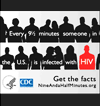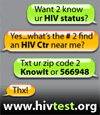2009 National Black HIV/AIDS Awareness Day
Transcript
[Announcer] This podcast is presented by the Centers for Disease Control and Prevention. CDC - safer, healthier people.
Hello. I’m Dr. Kevin Fenton, Director of CDC’s National Center for HIV/AIDS, Viral Hepatitis, STD, and TB Prevention.
February 7 is National Black HIV/AIDS Awareness Day – a day to focus on stopping HIV in the black community—and building on the progress we are making towards ending the HIV epidemic.
The burden of HIV in African American communities is staggering and we cannot allow this crisis to continue. Today we have many more opportunities than ever before to stop HIV. There is hope amidst the crisis.
African Americans face the most severe rates of HIV infection in the nation. The harsh reality is that 1 in 16 black men will be diagnosed with HIV at some point in their lifetime, as will 1 in 30 black women.
And black gay and bisexual men and black women are particularly hard hit by HIV. Nearly two-thirds of new infections among black men occur among men who have sex with men. Black women are also disproportionately affected by HIV, with infection rates 15 times as high as those of white women.
To turn the tide, we all have to get real about this disease and about its causes. It is important to remember that being of black race or being of black ethnicity does not put you at increased risk for HIV.
However, some African Americans face unique challenges that may place them at an increased risk of contracting HIV. Relatively high prevalence of HIV and other sexually transmitted diseases in black communities means that African Americans face a greater risk of HIV infection with each sexual encounter, compared with other ethnic groups.
Poverty and limited access to health care also increases the likelihood of HIV infection. Stigma and homophobia continue to keep HIV alive in our communities.
HIV is preventable and each of us can and must do our part. We all have to confront the realities about this disease and about its causes, and we all have to work together to stop the devastation of HIV in African American communities. In our own communities and across the nation, we must all agree that it is not acceptable for HIV/AIDS to continue to over-burden African Americans.
Here are some steps we can all take as a community. Together, we can join the many Black leaders and many communities who are speaking out against HIV. We can stand up against stigma, racism, and other forms of discrimination associated with HIV/AIDS. We can work together to ensure young Black Americans have the knowledge, the skills, the confidence and the motivation necessary to protect themselves against HIV for their entire lifetimes. As individuals, we can protect ourselves and our families from HIV.
CDC currently estimates that approximately one in five people living with HIV in the United States is unaware of his or her HIV infection. And this can lead to unknowingly transmitting the virus to others. So the first step to protect yourself and to protect others is getting tested for HIV. Prompt and early diagnosis of HIV is critical.
If you are diagnosed HIV positive, you can fully benefit from available life-saving treatments and take steps to prevent the spread of the disease. If you aren’t HIV infected, you can protect yourself and your family from HIV.
Make February 7, Black HIV/AIDS Awareness Day, a day to take action on HIV because everyone and every action counts. Learn more about HIV—talk to others, your family members, your friends, (and) your partners about HIV. And if you have never had an HIV test, or if your last HIV test was some time ago, do consider getting HIV tested again.
Remember, you have the power to stop HIV in Black communities. You can learn more about HIV and AIDS at www.cdc.gov/hiv and you can also get information on where to get an HIV test at www.hivtest.org. That’s hivtest.org. Thank you.
[Announcer] For the most accurate health information, visit www.cdc.gov or call 1-800-CDC-INFO, 24/7.




